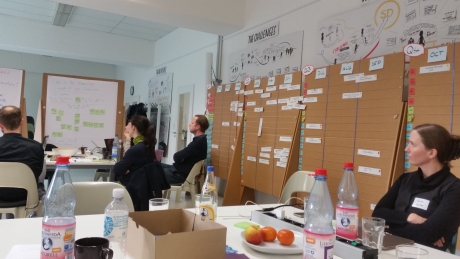
Workshop participants in the perfectly equipped Wikimedia Mosaic Room, photo by Sarah-Mai Dang, CC BY-SA 4.0.
Opening Research Data. Amplification and Reduction within Media Research Practices
Report about the 1st workshop of the working group Open Media Studies (German Society of Media Studies) by Sarah-Mai Dang and Simon David Hirsbrunner
In order to assess what «data» and «openness» mean for media research, the Open Media Studies interest group of the German Society for Media Studies (Gesellschaft für Medienwissenschaft – GfM) organized a workshop in cooperation with Wikimedia Deutschland e. V. on March 21, 2019 in Berlin. The scholarly interest group (SIG) was founded by Sarah-Mai Dang, Simon David Hirsbrunner, Adelheid Heftberger, Alena Strohmaier and Thomas Waitz last year in 2018 in order to raise awareness for open science/scholarship in media studies by discussing both challenges and potentials of ‘openness’ for scholarly practices in the field of media research. Focus areas include: open access, peer review, OER, copyright, gender and technology, open methodologies, and open data - the topic of the first workshop.
The aim of the one day-workshop was to apply a very open definition to research data, which may include metadata within digital media archives, as well as ethnographic field notes, social media tags and posts, maps and diagrams, gathered through qualitative, quantitative and mixed methods.
A group of about 20 participants in the field of media research (including media scholars, ethnographers of Science & Technology, computer scientists, art historians, as well as practitioners such as archive managers, librarian employees, and legal experts) discussed the challenges of opening up research data from an application-related as well as conceptual perspective. It also provided a framework for further collaborations and initiatives within the SIG and beyond.
In the round of introduction, participants presented some of the key questions and challenges faced within their research. There was a broad range of questions raised concerning the impact of data in film history, the set up of an archive or a repository including audiovisual material, the conflict between ‘big data’ and ‘small data’ in terms of funding, collaborative data practices, the ephemeral and constant change of data, digital methods and annotation, access to data and open methodologies, open source culture, artistic practices, qualitative research, RDM, OER, copyright, open access. During the day of the workshop, we focused on some of these issues more in detail, debated controversial issues within the group, and brainstormed about ways going forward.
Open Infrastructures
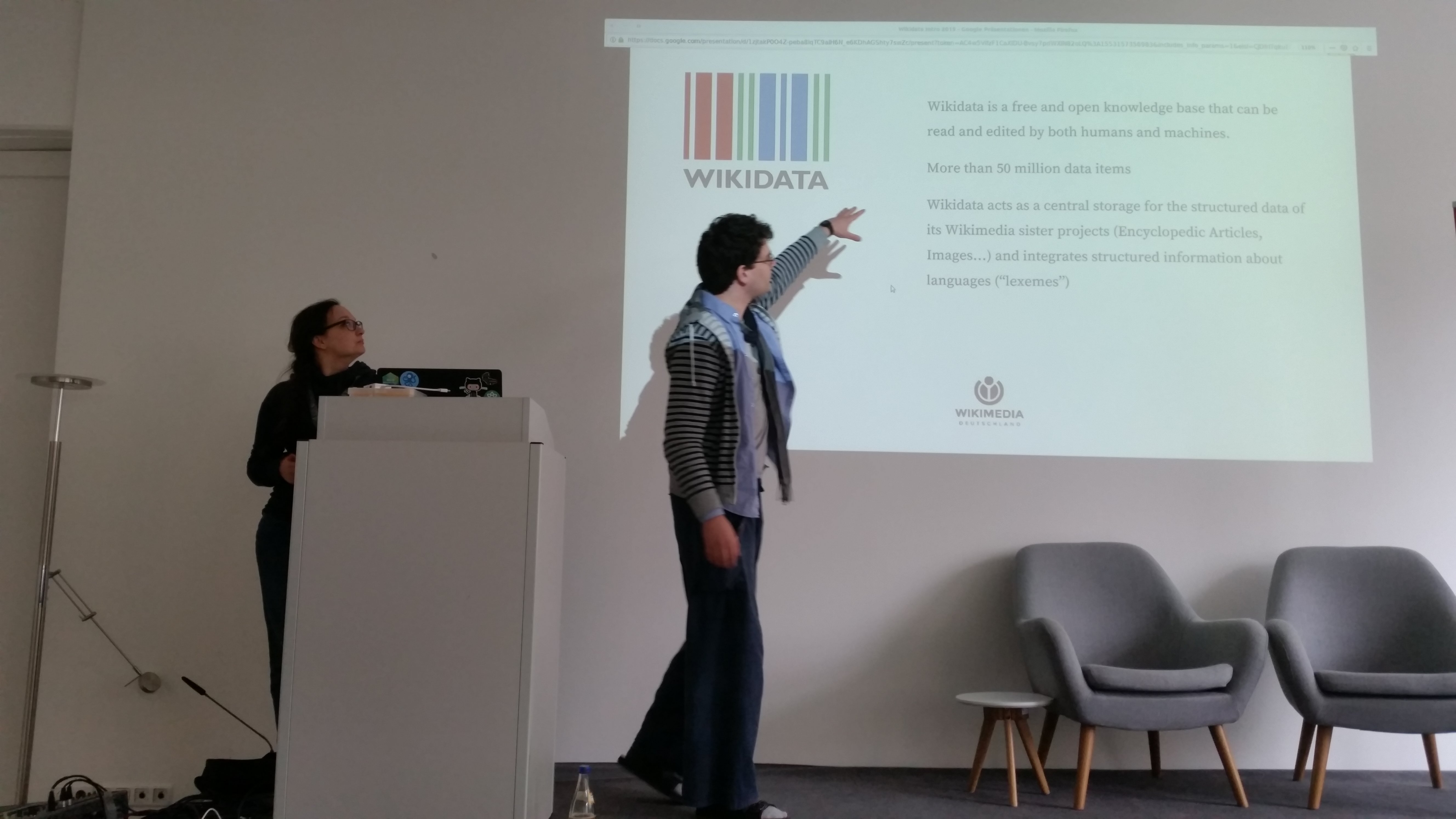
Linda-Rabea Heyden and Jan Dittrich on the status of knowledge within Wikidata, photo by Sarah-Mai Dang, CC BY-SA 4.0
In an input presentation, Linda-Rabea Heyden and Jan Dittrich introduced Wikidata, a free knowledge base developed by the Wikimedia foundation and a large community of contributors. Linda and Jan made the case for using Wikidata as a research device, illustrated by various examples (Wikibase, Histropedia, Scholia and Factgrid).
In the group, we debated the (potential) role of Wikidata (which encompasses more than 50 million data items) in research processes, and in what particular ways it may be useful within media research. The discussions showed that Wikidata may not only be relevant as research tool, but also constitutes a fascinating research object to be investigated; e.g. due to its double purpose to be an infrastructure open to humans, but also open to machines (machine readability).
Moreover, the discussions focused on status and quality of the knowledge stored in Wikidata. It was argued that Wikidata doesn’t store ‘facts’ but has to be viewed in terms of politics of representation -who uses Wikidata, who edits and uploads which items? (for example, see also Wendy Faulkner: The technology question in feminism: A view from feminist technology studies)
Open Citations: Zotero Project «Digital Media Research»
As part of the workshop, we also conducted a live experiment in opening data by gathering literature references on media research, sharing them and making the collection available online. The feedback from the group confirmed the value of such a collection, several participants adding their resources directly in the session. However, the debate also showed the challenges of «opening up». While people did not so much bother to «give away» free knowledge, they mentioned the barrier of «extra work» - though not officially acknowledged as legitimate research outcome in the community - involved in making their data truly open, i.e. useful for others. As an incentive it was discussed whether to make the Zotero group accessible only to scholars who are willing to contribute to the database. In this case of literature references, truly open data would require comprehensive data curation in order to avoid messiness, e.g. defining categories and tag structures, including abstracts, advertising the collection further in issue-specific target groups.
If you’d like to join the initiative, please do so via:
https://www.zotero.org/groups/2238526/open_media_studies_scholarly_interest_group_at_gfm
The Heterogeneity of Data, Resources, and Approaches: Further Discussions and Questions
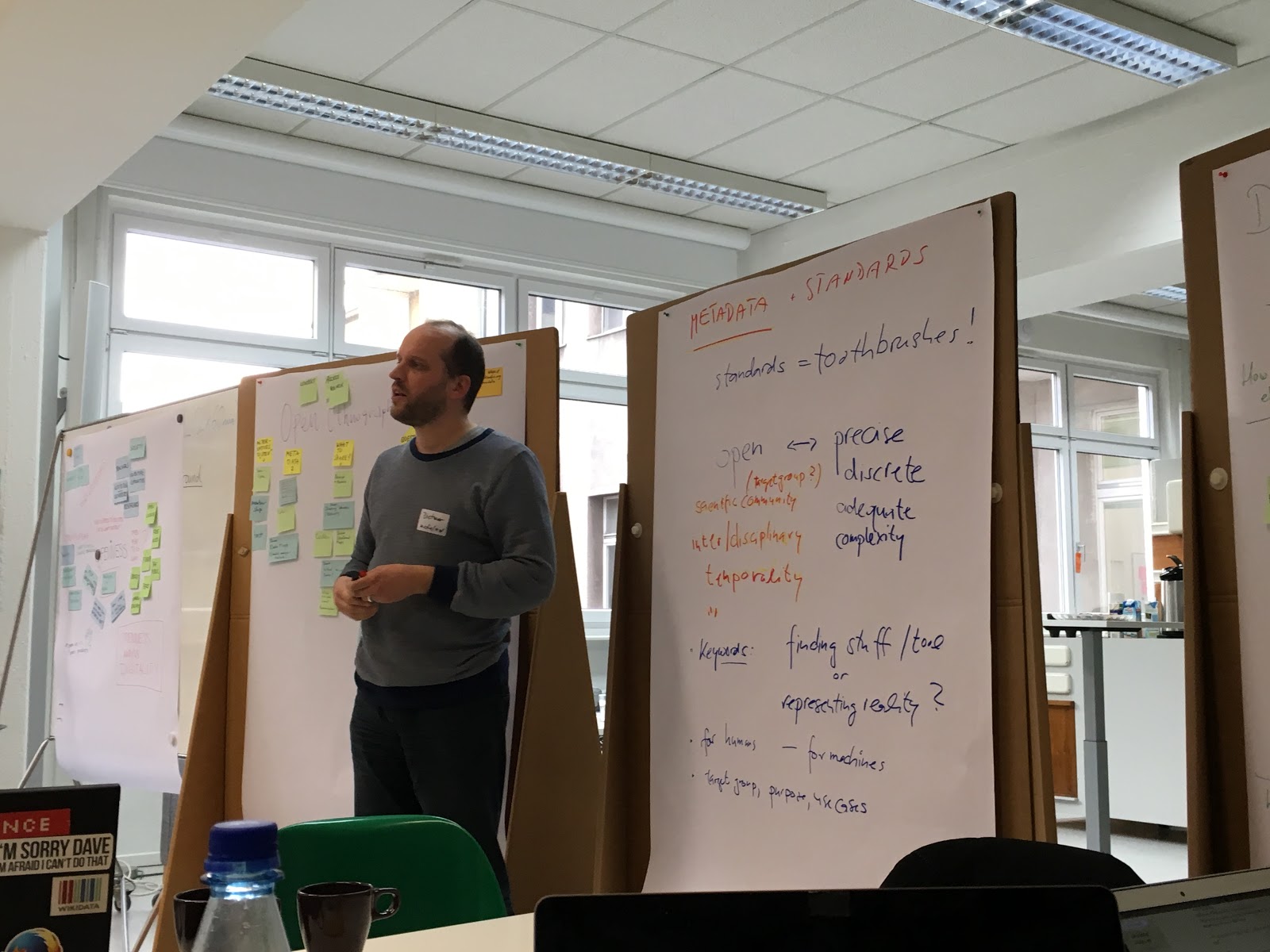
Dietmar Kammerer explains the outcome of session 2, «Challenges of metadata and standards», photo by Simon David Hirsbrunner, CC BY-SA 4.0
Particular issues of open research data were discussed in four breakout sessions: 1. Metadata, 2. Open ethnographic data, 3. Openness and digitality, 4. Data in the Humanities: concepts and legal frameworks, followed by a plenary session. Session 1 addressed issues of standardization and situated meaning and access, whereas session 2 focussed data in the context of ethnography with their long history of dealing and reflecting on «data», also taking into account locality and messiness. Session 3 analyzed how the concepts/phenomena openness and digitality, both usually discussed in connection, are related. In session 4, the significance of current copyright restrictions for archival work and databases were presented to the participants.
During the workshop it became apparent that one of the biggest challenges is to be aware of the heterogeneity of research data and resources and thus differentiate between various data and research purposes. Different questions can be applied to different sources. And, vice versa, different sources raise different questions. Moreover, during the discussions, it became clear that above all we need to ask principal questions in order to understand how research data can be opened up. Open data cannot be a goal per se. Instead, we need to ask for whom do we want to open up our research, why and how? Does open research data always serve our intentions? Who can benefit from «openness» and who or what will be left behind? What does standardization mean in terms of essentializing and universalizing? Free data cannot be equated with open data. Accessibility cannot be equated with online publication.
After a day of valuable debates, many issues remain open and need to be further explored. We are still looking for answers as well as new questions concerning the impact of digitalization on our research, the datafication of our scientific practice, and the quest for truly open science.
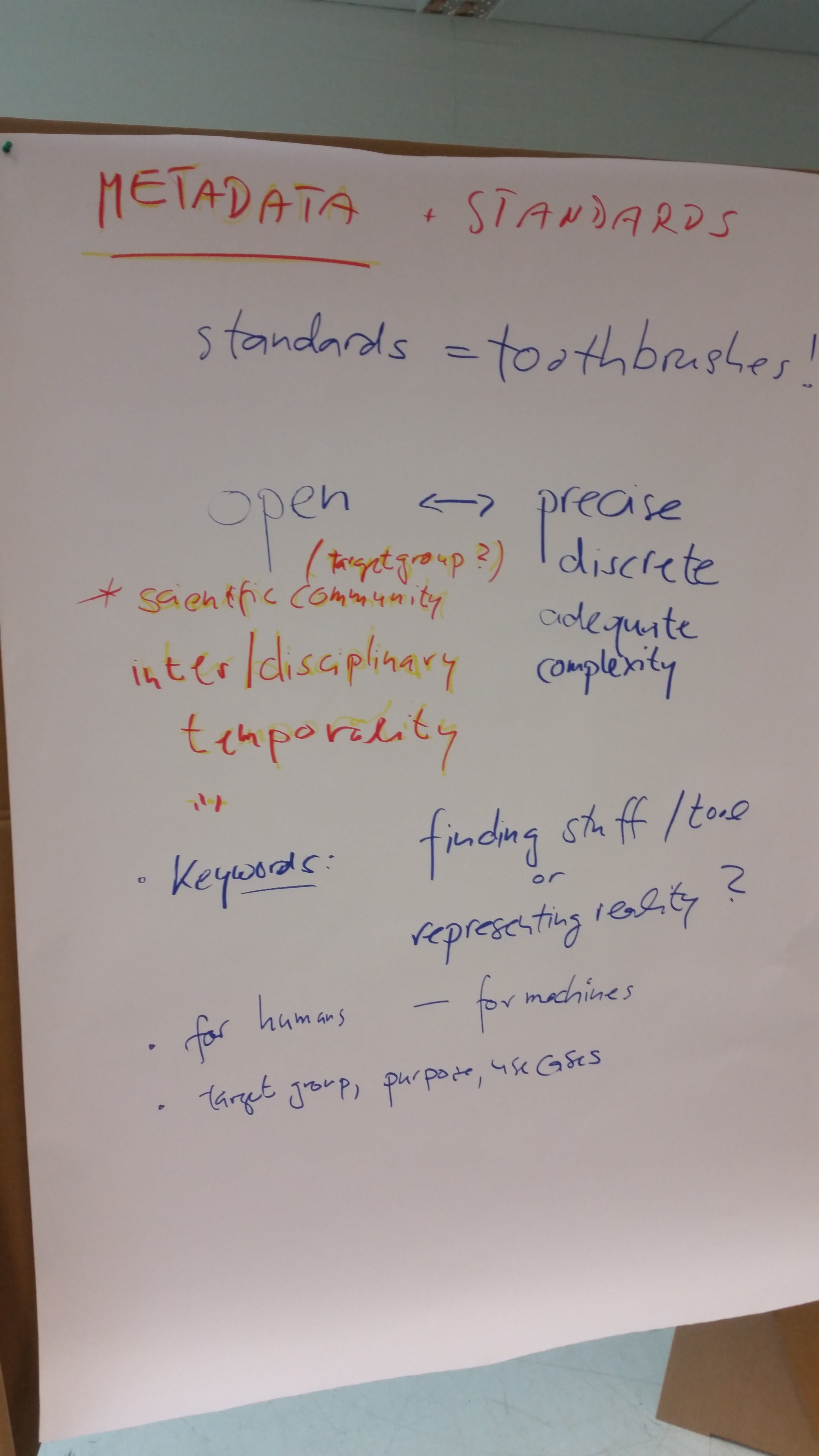
1.) Breakout Session «Metadata», led by Dietmar Kammerer, photo by Sarah-Mai Dang, CC BY-SA 4.0
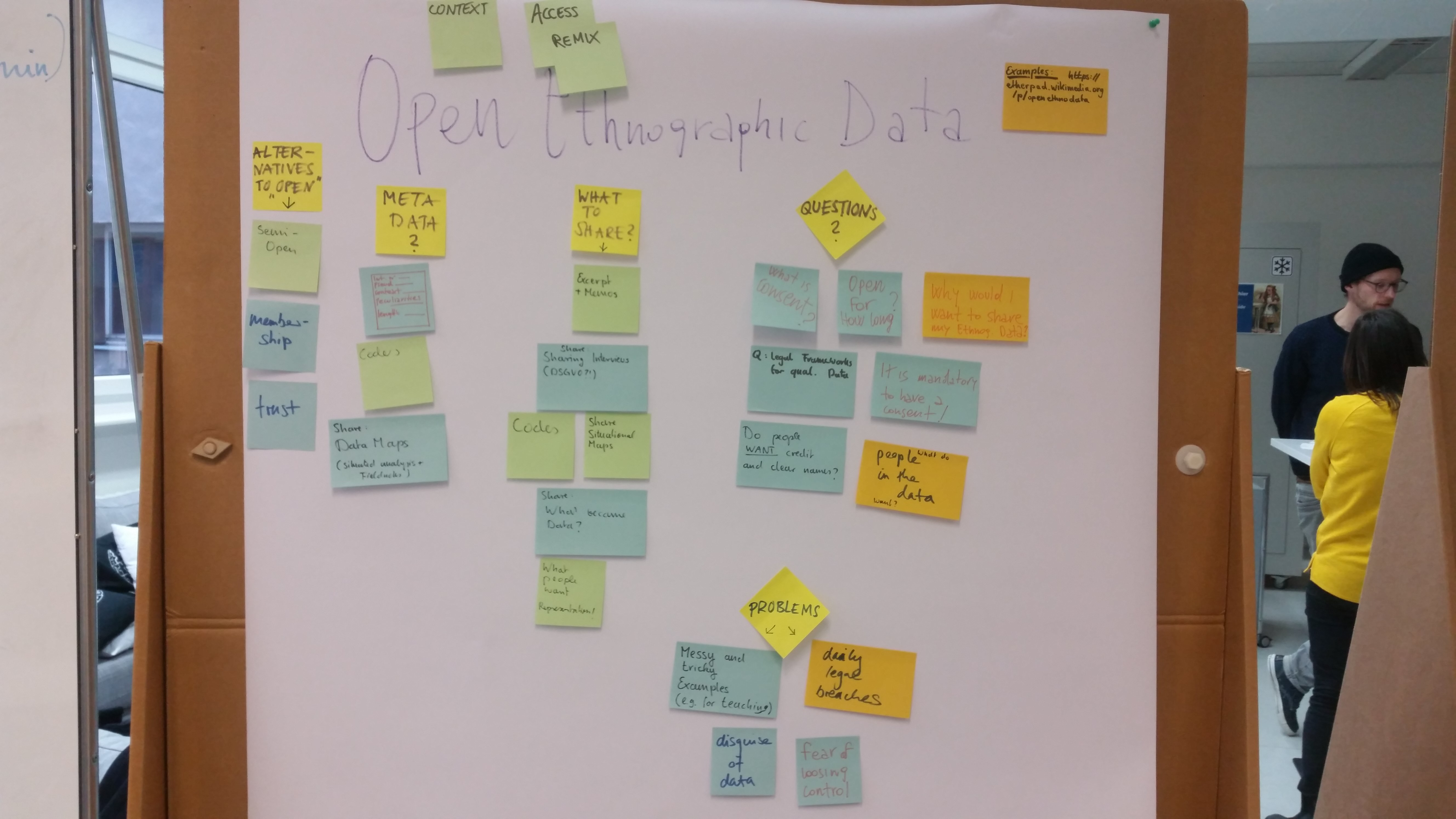
2.) Breakout Session «Open Ethnographic Data», led by Gaia Mosconi and Simon David Hirsbrunner, photo by Sarah-Mai Dang, CC BY-SA 4.0
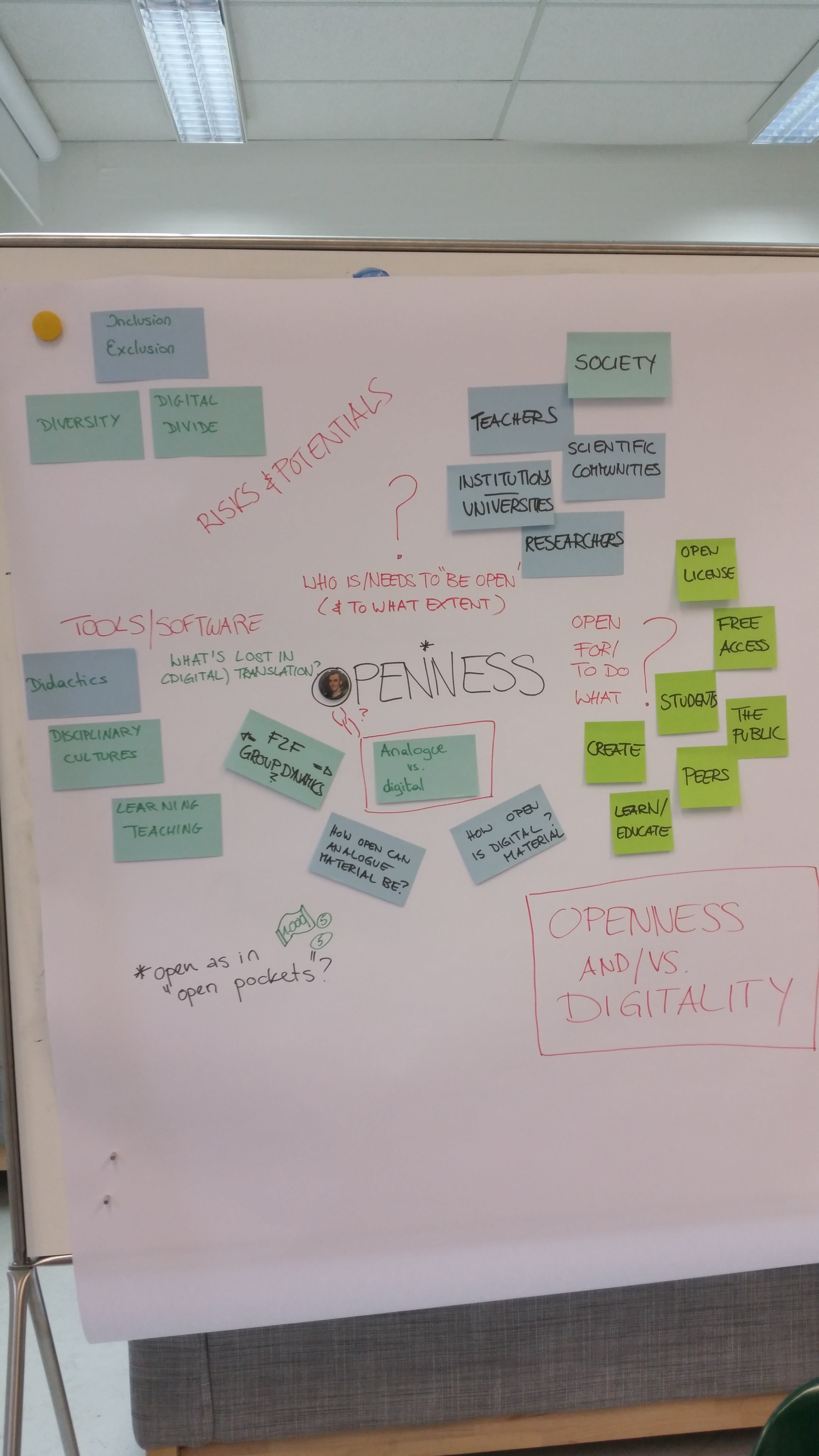
3.) Breakout Session «Openness and Digitality», led by Maike Sarah Reinerth, photo by Sarah-Mai Dang, CC BY-SA 4.0
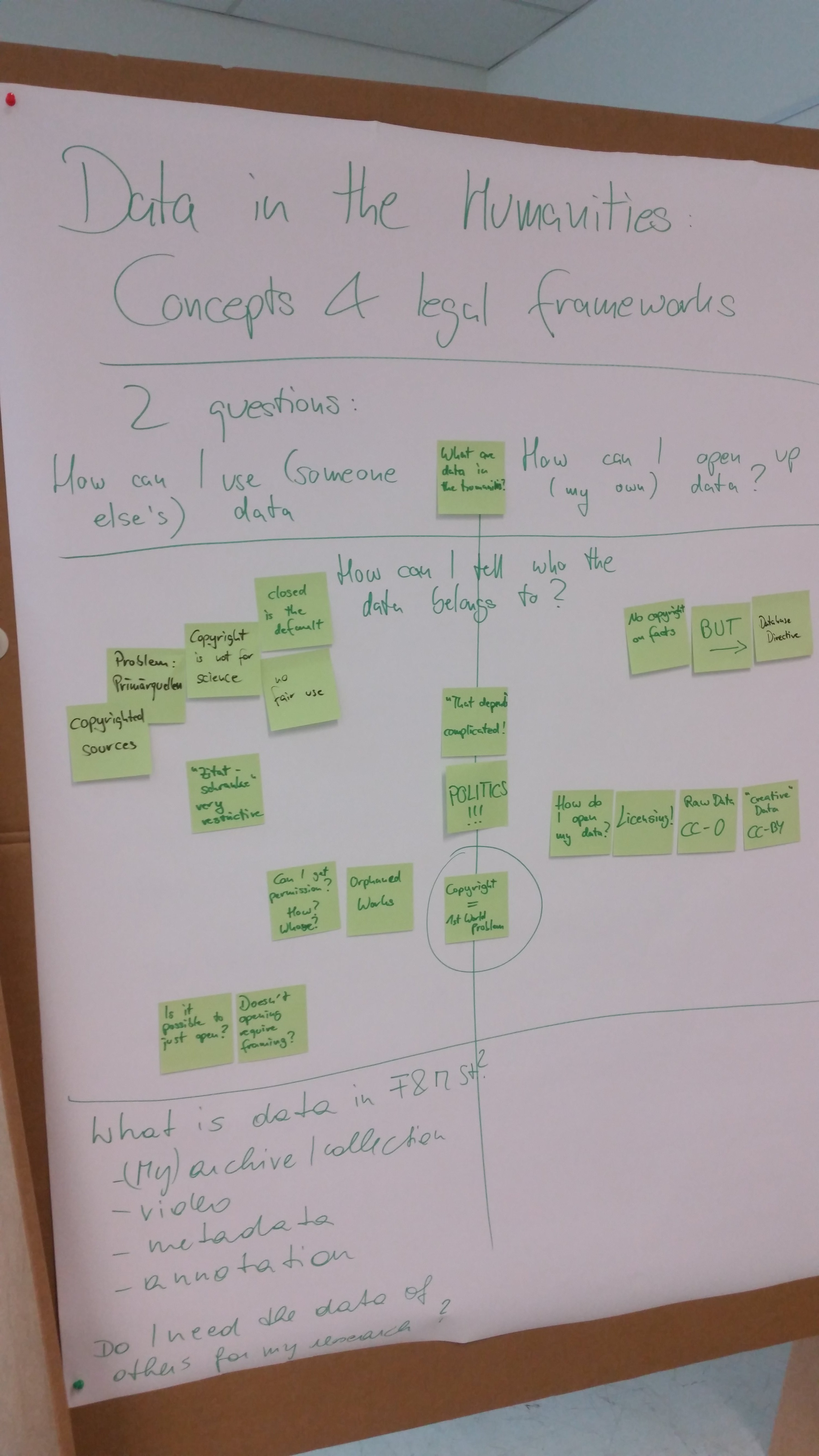
4.) Breakout Session «Data in the Humanities. Conceps and Legal Frameworks», led by Marion Goller and Adelheid Heftberger; photo by Sarah-Mai Dang, CC BY-SA 4.0
Bevorzugte Zitationsweise
Die Open-Access-Veröffentlichung erfolgt unter der Creative Commons-Lizenz CC BY-SA 4.0 DE.